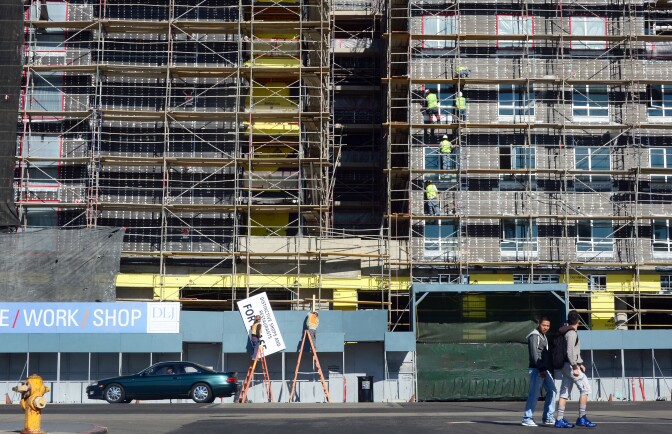This story is free to read because readers choose to support LAist. If you find value in independent local reporting, make a donation to power our newsroom today.
This archival content was originally written for and published on KPCC.org. Keep in mind that links and images may no longer work — and references may be outdated.
New LA fees on developers earmarked for affordable housing

The Los Angeles City Council voted Wednesday to charge developers a fee to pay for affordable housing. Advocates see the so-called linkage fee as key to solving the city’s housing crisis and keeping low-income residents from slipping into homelessness. But developers say it will slow construction of new housing and drive up prices for existing units.
The program is expected to generate about $100 million annually, which will go into a trust fund to produce or preserve about 1,700 existing affordable housing units. A city report estimates the average cost of creating a new unit is just under $450,000.
Developments in higher-market areas of the city will pay higher fees — up to $15 per square foot of floor space. The fees will be phased in over an 18-month period.
KeAndra Dodds, co-organizer of Coalition for a Just Los Angeles, one of the groups that pushed for the fee, said the decision was “huge."
“We think it’ll really make a huge impact on our ability to build more housing that’s affordable to low-income folks here in Los Angeles,” she said.
The vote comes more than two years after Mayor Eric Garcetti first proposed the fee. He noted Wednesday that the effort has been “decades in the making.”
“Today we see hope that when we see luxury condominiums going up that we can make sure that there is money paid in for housing for the rest of us, as well," Garcetti said at a news conference outside city hall following the vote.
LA City Council about to vote on charging fee to developers to build affordable housing. @KPCC pic.twitter.com/HVu3IXLD8W
— Jill Replogle (@jillrep) December 13, 2017
Los Angeles now joins San Francisco, San Diego and Boston, which charge similar fees on new developments.
Under LA’s tiered fee schedule, developers wanting to build residential complexes with two to five units or less in low- to medium-high market areas will pay the smallest fee at $1 per square foot of floor space.
For residential complexes with six or more units, that fee goes up to $8 to $15 per square foot of floor space, depending on the market value of the area.
Hospitals, public institutions, granny flats and small single-family homes (1,500 square feet or less) are exempt from the fee. Developments that include affordable housing units either voluntarily or by requirement are also exempt.
Developers have opposed the linkage fee in LA, but nobody spoke up against the measure during the city council meeting Wednesday.
Mario Marrufo, president of the Lincoln Heights Chamber of Commerce, predicted the measure would backfire on its promise of incentivizing more affordable housing.
“Pretty much extorting money out of developers doesn’t help the cause,” he said. "You want to incentivize them so they can build."
This map shows areas of Los Angeles that would carry different linkage fees based on residential market rates in those areas:
- “Low Market Areas” would assess fees of $1 to $8 per square foot for new residential developments
- “Medium Market Areas” would asses fees of $1 to $10 per square foot for new residential developments
- “Medium-High Market Areas” would assess fees of $1 to $12 per square foot for new residential developments
- “High Market Areas” would assess fees of $3 to $15 per square foot for new residential developments
This story has been updated.
Click on the blue media player above to hear Jill Replogle's full conversation with Take Two guest host Josie Huang








